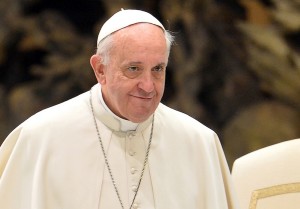
By Susan Gately - 22 August, 2015
 Pope Francis devoted his weekly audience on Wednesday to the topic of work, describing it as “sacred”.
Pope Francis devoted his weekly audience on Wednesday to the topic of work, describing it as “sacred”.
The Holy Family was a “family of workers”, Jesus was described as the “son of a carpenter” or “the carpenter”, and St Paul warned Christians “If anyone will not work, let him not eat.” (2 Thess 3:10)
“That’s a good recipe for losing weight, you don’t work, you don’t eat!” Pope Francis commented to pilgrims gathered in Paul VI hall.
Work, beginning with that in the home, is concerned with the common good, he said.
“Where does one learn this hard-working lifestyle? First of all, one learns it in the family. The family teaches work through the example of the parents: the father and the mother who work for the good of the family and of society.”
Pope Francis said prayer and work can and must be in harmony. “The absence of work damages the spirit, just as the absence of prayer damages practical activity.”
 Work is sacred, it gives dignity to a family. “Causing the loss of jobs means causing serious harm to society,” said Pope Francis.
Work is sacred, it gives dignity to a family. “Causing the loss of jobs means causing serious harm to society,” said Pope Francis.
“I rejoice greatly when I see governments make great efforts to find jobs and seek that everyone has work.”
Commenting on the Pope’s praise for government job creation, Fr Séan Healy from Social Justice Ireland said that he believes there will always be large scale unemployment in the world no matter what governments do.
In Ireland current statistics show over 200,000 people are unemployed (9.7%).
Fr Healy agreed it was critically important for governments to do all they could to maximise and develop quality jobs but said what was needed was a “new system whereby people’s right to work is respected and acted on even when there aren’t paying jobs for large numbers of people”.
To this end, Social Justice Ireland proposes a basic income to be paid to everyone (of around €188 per week) which would in effect recognise work done in the home, community or in a person’s own development or education.
Tax credits would be removed and “three quarters of social welfare payments would be eliminated,” Fr Healy told CatholicIreland.net. People would pay tax on all of their income.

Economist Prof Ray Kinsella, lecturer Smurfit Business School
Economist Ray Kinsella told CatholicIreland.net that the importance of work for human beings was well established, with the long -term unemployed suffering what is known as the “scarring phenomenon”.
He referred to a study which mapped over the course of a year the changes in a person who goes from being in employment to losing his or her work to becoming totally dependent and “scarred”.
The economics professor told CatholicIreland.net that practical measures by government could make a difference – like making “adequate funding” available for small business start ups and encouraging third level institutions to reach out to start ups.
He paid tribute to the campus companies being incubated at UCD. “There is great synergy there,” he said.
“There is a lot that can be done to lift the burden of administration on small firms – to simplify and if possible remove the enormously expensive layers of bureaucratic reporting requirements which in some cases provide marginal returns,” he said.
Dr Kinsella said the most important thing government could do as regards helping jobs flourish was to “respect individuals who start businesses and incentivise them.”